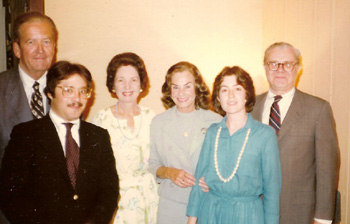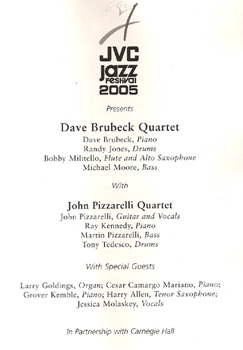The other day, Joe Jervis posted a very moving entry at
Joe.My.God. Entitled "Mrs
Witten," it was about a middle-aged businesswoman coping with the
huge expense, uncovered by Medicare, of her father's cancer medication. Perhaps
because I'm a writer, I found myself re-reading the entry to imagine Joe's
thinking as the quiet drama unfolded. When did he know that it was something
that he would write up? Did he make a point of remembering particular details,
or does he just soak them up? Like everybody else, I love a good story, but I
have never been able to get myself to try writing one. So it is with genuine
admiration that I hail Joe Jervis as a truly gifted story-teller. And I'll
probably say so again, the next time he wows me.
One of Mrs Witten's drugs was Thalomid. Wondering why Medicare
wouldn't cover an analgesic (and somewhat surprised to learn that the drug has
ever been approved in the United States), I did a quick bit of research and
discovered that "Many consider thalidomide to be the first new agent with major
antimyeloma
activity in more than 30 years." The page is somewhat conflicted - perhaps only
to a layman - about the status of FDA approval for thalidomide therapy, but I
gather that it is pending. That might be why Medicare doesn't (have to) pay.
When I told Kathleen this, she shuddered a "there but for the grace of God"
shudder. Of course, we were both thinking about my Remicade infusions.
Kathleen assures me that Remicade was approved for my syndrome
(which ought to have a name - and a snazzy name at that) at about the time that
I had my first infusion. At the time, she adds, each infusion had a price of six
thousand dollars. That would have translated into $48,000 in the past year - an
expense that we could hardly afford. Any doubts about the efficacy of the drug
were dispelled this past April. The scheduled infusion was canceled because
there was a possibility that I had developed an allergy to Remicade; the doctors
eventually decided that the allergen was something else. But for two and a half
weeks, I felt at the start of each day that I had fallen down a flight of stairs
from the previous day's level of malaise. When the rheumatologist saw me at the
beginning of May, I didn't even have to say how I felt or how desperate I was to
resume the infusions. He simply told me that I had to get back on schedule
quickly. There were no openings at the Infusion Unit until late May, but I
jumped to fill a cancellation on the tenth. I was glowing within three days. The
ups and downs with this drug are extremely sharp.
For reasons too arcane (for this entry, anyway), I probably
ought to have started Remicade properly again, with three infusions within six
weeks. I know that I could have used a second, about a week ago. My next
infusion is scheduled for 5 July, and I think I'll just make it. I'm having a
lot of difficulty lifting anything over my head, and getting into bed has begun
to be painful again. I can live with it, knowing as I do that it will come to an
end as of a date certain, but I want you to know that without Remicade my life
would be a lesser thing. I would be a semi-invalid, capable of cleaning myself
but not much more. Walking more than a block would be a trial. And a grey haze
of depression would settle over everything. I don't know that I would ever stop
feeling guilty for being so helpless and unproductive.
Fifteen years ago, when my degenerative illness was moving
toward center stage, Remicade did not exist. So I have just told you what the
rest of my life might have been like. If I'd been born a hundred years ago, I
don't know what they would have called what's wrong with me. We know that Ramses
II had it, but it lacked a name (ankylosing spondylitis) until quite recently,
some time after I began to express symptoms. So I am very glad to be living
right now. But stories such as Mrs Witten's can bring on moments of vertigo. And
I have to ask: am I worth $48,000 a year, just to keep functioning? As I've
phrased it, that seems like a terrible question, but consider what it really
asks: is there any justification for my benefiting from a treatment that many
people cannot afford? (And I expect that there are many patients who don't even
know it exists.) I salve my conscience a little by imagining that, if more
people received the drug, its cost would come down. This is not necessarily
true. It is fabricated on the spot, not in a factory, which means that a
technician composes every dose. Then it is administered over a two-hour period
via a regulated (pumped)
intravenous drip.
Recipients' vitals are measured throughout the infusion. At the Hospital for
Special Surgery, there are ordinarily four nurses on duty, in a room that seats
no more than five patients at a time. (And even then not everybody in the unit
is getting Remicade - far from it.) All this to treat an ailment that is not
life-threatening. Just life-diminishing. I don't get anywhere with the question,
of course, because to thank heavens for my good luck is not an answer, even if
it is the answer that our leaders have been trying to get away with for decades.
Please blame Joe Jervis if you've found this bleak reading. I
don't mean the man himself, I mean "Joe Jervis," the story-teller. It occurred
to me as I was coming home from yet another appointment (gastroenterology) this
afternoon that Joe's stories are so well crafted, and so complete in themselves,
that it is probably prudent to make a certain distinction. Just as we speak of
"the Marcel of the novel," so we should speak of "the Joe of the blog."








